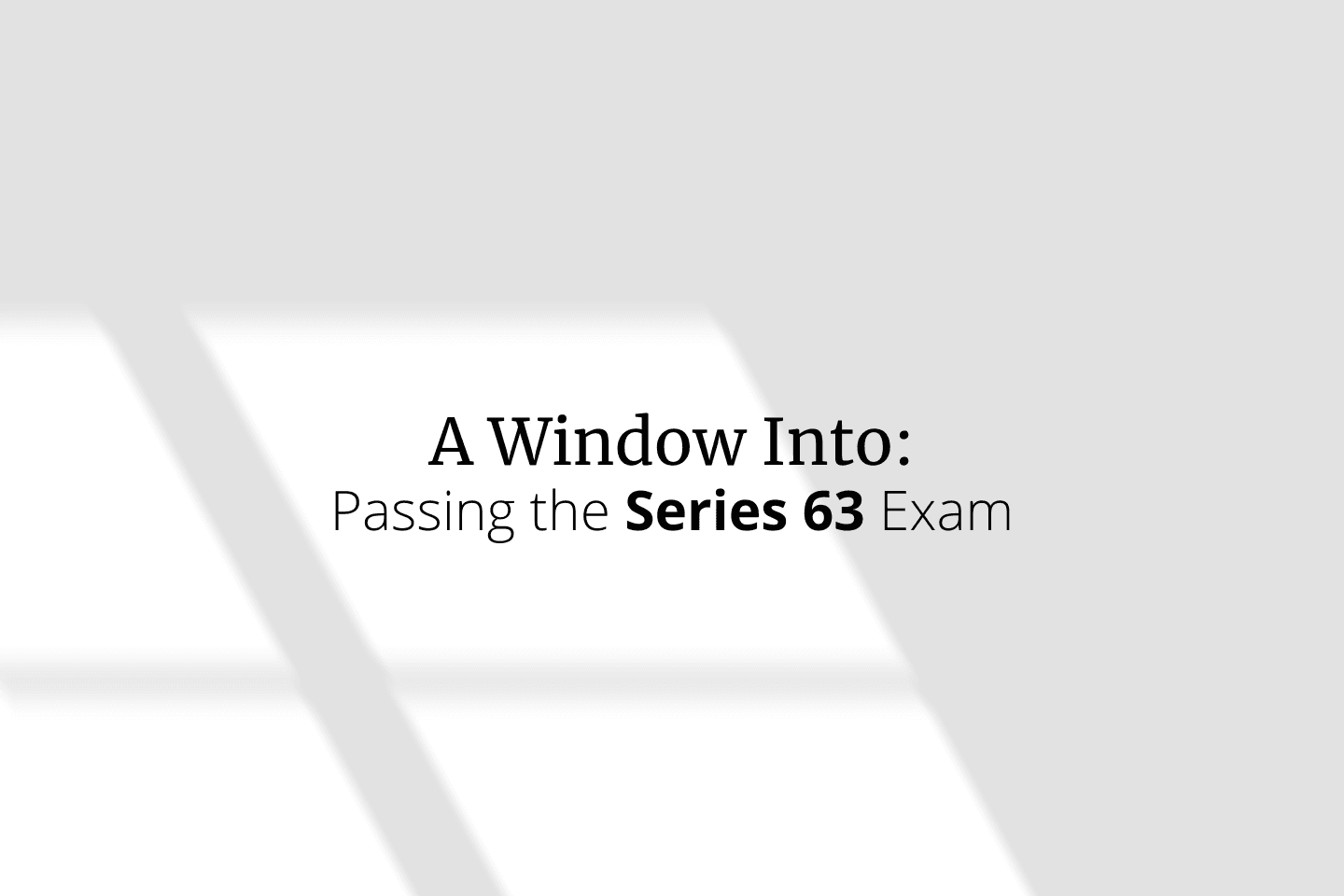What You Need to Know to Pass the Series 63 Exam
Filed in: Exam Prep, FINRA Exam, Series 63, Study Tips

You’ve passed the SIE and Series 6. You’re so close to your license as a FINRA limited registered representative that you can almost reach out and grab it. All that’s left is one hurdle—the Series 63, the exam that assesses your knowledge of the state laws associated with securities and registered representative activities. While this last exam will test some material you have seen in previous exams, the Series 63 presents new challenges:
- This exam introduces state securities laws and regulations that you have not yet been tested on.
- Legal writing colors many of the questions and answers, which means they can be convoluted and long.
- Because our legal code is often predicated on exceptions to, or exemptions from, certain laws, negative logic plays a major role in this exam. The ability to simplify some of these legal concepts is crucial to success on the Series 63.
Another key difference is that while your other FINRA exams focused on product knowledge, the Series 63, largely written by NASAA, focuses on the blueprint for state securities laws, called the Uniform Securities Act (USA). These state securities laws aim to protect retail investors from fraud. This blueprint for these state laws, and its interactions with various Federal laws, comprise the bulk of the 60 questions that will count toward your score (five additional unidentified, experimental questions are not scored).
Let’s dive into areas you will want to focus on to ace your Series 63 exam.
Registration of “Persons”
Many of the questions on the Series 63 (formally known as the Uniform Securities Agent State Law Examination) revolve around the registration of four key “persons” in the financial services world. As this is an exam steeped in legalese, some words are used differently than we would use them in everyday language. The word “person” can mean nearly any entity or human being, for example.
Of vital importance for this exam are four “persons”: broker-dealers (BDs), agents, investment advisers (IAs), and investment adviser representatives (IARs). While all four are legally considered “persons”, BDs and IAs are usually firms, while agents and IARs are typically individual human beings on the Series 63. Make sure you can answer four questions about each of these “persons”:
- Who is that person? (definitional question)
- Who isn’t that person? (exceptions or exclusions from that definition)
- When does that person have to register to do business in a particular state?
- When doesn’t that person have to register to do business in a particular state?
Of the four “persons” above, arguably the most attention is paid to IAs as these firms were not previously emphasized on your FINRA exams. The following elements of IA firms are also often covered on the Series 63 exam:
- Federal covered IAs (FCAs) vs. state-registered IAs
- Access persons
- The “brochure” rule
- Soft dollar practices
- Rules regarding “custody”
- IA advertising rules
What Else You Need to Know to Pass the Series 63
The rest of the Series 63 is comprised of rules and regulations that have mostly been covered in the SIE and Series 6. Again, the focus here is on preventing retail investors from being defrauded in the securities industry. Consequently, the distinction between fraudulent and unethical acts will be tested. State administrators enforce the provisions of the Uniform Securites Act in their own states and therefore will be the subject of several questions on the Series 63. Registration of securities plays a lesser role on the exam since that is now mostly handled on the federal level through the SEC.
Will Passing the SIE and Series 6 Help You Pass the Series 63?
Some of the rules and regulations learned in preparation for both tests will help on the Series 63, but the product knowledge necessary to pass these earlier exams is of secondary importance on this NASAA exam.
Any FINRA or NASAA exam is a challenge, and the Series 63 is no different. Once you master the registration of “persons” and particularly rules regarding IA firms, you have an excellent chance of succeeding on the Series 63 exam. Learn more about the Series 63 here. Learn about our Study Essentials course that offers high-performance strategies and can help you approach the challenge of preparing for this exam with a growth mindset.
Written by Ernie Varela
Dr. Ernesto (Ernie) Varela, CFP® has worked for decades as a professor, trainer, and thought leader. He has held his Certified Financial Planner (CFP®) license for more than 20 years, and has worked for several financial service companies in leadership roles. His doctorate is in Organizational Leadership, and he also holds advanced degrees in Business and Literature. Ernie has taught adults in classroom and online settings for decades.
Related posts
- Read more
Exam Tips to Perform Under Pressure
High-stakes securities exams such as the SIE, Series 65, Series 79, or Series 24 can feel overwhe
- Read more
Efficient Exam Prep for Busy Professionals: Strategy Advising
Studying for a high-stakes securities exam like the Series 24 or Series 79 isn’t just about putti
- Read more
Crush the SIE Exam with the Video Vault
Are you feeling overwhelmed by the sheer volume of Securities Industry Essentials (SIE) exam cont


